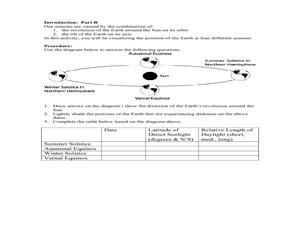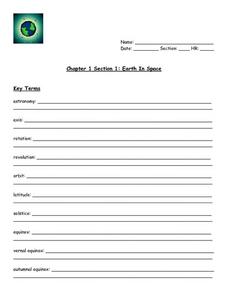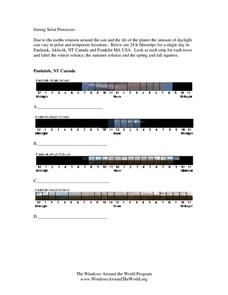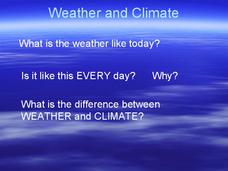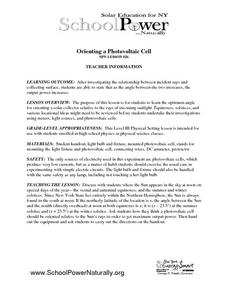Stanford University
Solstice and Equinox Season Model
How can December 21 be the shortest day of the year when all days are 24 hours long? Pupils see how to build a model showing the differences between winter and summer solstices and equinoxes. Using this model, classes can then discuss...
Curated OER
Solstice and Equinox
Students identify the dates of the solstices and equinoxes and how they relate to the various seasons on Earth. After discussing how the solstice and equinox affect the seasons, students use their bodies to demonstrate the how each...
Curated OER
Solstice and Equinox Quiz
In this solstice and equinox quiz worksheet, students complete an on-line quiz, clicking on questions and matching answers, scoring 1 point for each correct answer. A printed version is available.
Curated OER
Motions and Their Effects
With a simple blackboard-style appearance, these slides list facts about the reason for the seasons, solstices, and equinoxes. It also touches on Kepler's first law of planetary motion. There are no pictures or graphics to help explain...
Curated OER
Exploring Seasonal Shadows and Sunlight
What can shadows tell us about the changing season? Over several months, astronomy learners record length and position of an outdoor object's shadow, such as a flagpole. They apply the data to a growing hypothesis and note the...
Curated OER
The Sun's Path
Starting with questions about the tilt of the Earth and apparent motion of the sun, a worksheet provides instructions on how to figure the paths of the Sun on certain dates. Learners answer three more questions, complete with...
Curated OER
Solstice And Equiniox Curriculum
Students engage in a lesson that investigates finding the dates of the solstices and equinoxes. They define the terms related to the concept and conduct research in order to explain the physical occurrences. They also relate to how the...
Curated OER
Suns Path and Seasons
Using a plastic dome to represent the hemisphere of the sky, your class is able to demonstrate the path of the sun at different points of the day and year. They use a protractor to record movement and answer questions about...
Weber State University
The Sun and the Seasons
Why is there more daylight in June than in December if you live above the equator? How does the angle of sunlight shift throughout the year? Answer these questions and more with an interactive article about the sun, its path through the...
Teach Engineering
Solar Angles and Tracking Systems
The sun will continue to rise in the east and set in the west, no matter what. The first instructional activity in a series of eight introduces the class to solar angles. It makes connections between a person's latitude and the angle of...
Curated OER
Earth in Space
In this reason for the days and nights on earth worksheet, students study the reasons the Earth has days and nights by answering 28 questions about earth's rotation, the equator, the relationship between the sun and moon, and the earth's...
Curated OER
Reasons for Seasons
Students investigate a model of the tilt of the Earth in its relationship to the Sun during the different seasons of the year. They study the solstices and equinoxes, while determining how sunlight hits the Earth with different angles in...
Curated OER
A New Slant On The Seasons
Learners identify how the tilt and position of the Earth causes the seasons. After a discussion of the seasons and when they begin. Using themselves as the objects in the universe, they role play how the rotational movement of the...
Curated OER
Seeing Solar Processes
For this seasons worksheet, students compare 24 hour filmstrips for a single day in Canada, the U.S.A., and the Arctic Circle to determine the different seasons. This worksheet has 12 fill in the blank.
Curated OER
Celebrating the Solstice and Equinox
Fourth graders graph the number of daylight hors throughout the year and examine why day length varies. They discover that seasonal changes and latitude on Earth affect the number of hours of daylight in each day. Students listen to...
Curated OER
Reasons for Seasons
Students model the tilt of the Earth as it orbits the Sun. They explain the meaning and characteristics of solstices and equinoxes. They explain that sunlight hits the Earth at different angles at different locations over the course of...
Curated OER
Weather- Online Research
In this online weather research worksheet, students search for answers about winds, storms, clouds, and define the equinox and solstice. They use the links provided on the page to find the information.
CK-12 Foundation
Seasons: Shadow Lengths
Before iPhones and calendars, how did humans determine the seasons of the year? Middle school scientists discover how to use shadows to determine the time of year in an enlightening interactive. Pupils manipulate the sun and examine the...
Curated OER
Weather and Climate
It's hot today, but is that the weather or the climate? This colorful presentation isolates both concepts to allow for better understanding by covering the positioning of the planet, making comparisons of land versus water, and looking...
Curated OER
Seasons' Journey: As the World Turns
Fourth graders explore the earth's revolution around the sun and the changes in weather that follow this motion.
Curated OER
Orienting a Photovoltaic Cell
Students explore the optimum angle for orienting a solar collector relative to the rays of incoming sunlight. They review equinoxes, solstices, and various locational ideas before students investigate using meters, light sources, and...
S2tem Centers SC
Seasons
Winter, spring, summer, and fall—take the learning of the seasons beyond the elementary level to the middle school classroom. Curious learners begin by watching videos about the seasons and the rotation of planet Earth. Then,...
Curated OER
The Reasons for the Seasons
Young scientists use a globe and a light to simulate the rotation of the earth and sun to show the seasons. Additionally, they simulate direct sunlight and indirect sunlight showing intensity of the sun, and answer questions based...
California Academy of Science
Kinesthetic Astronomy: Birthday Stars
Space explorers take a virtual trip around the sun right within your classroom! They stand in a circle facing away from the "sun" (a lamp) in the center of the room. As they move according to your instructions, they view different...









